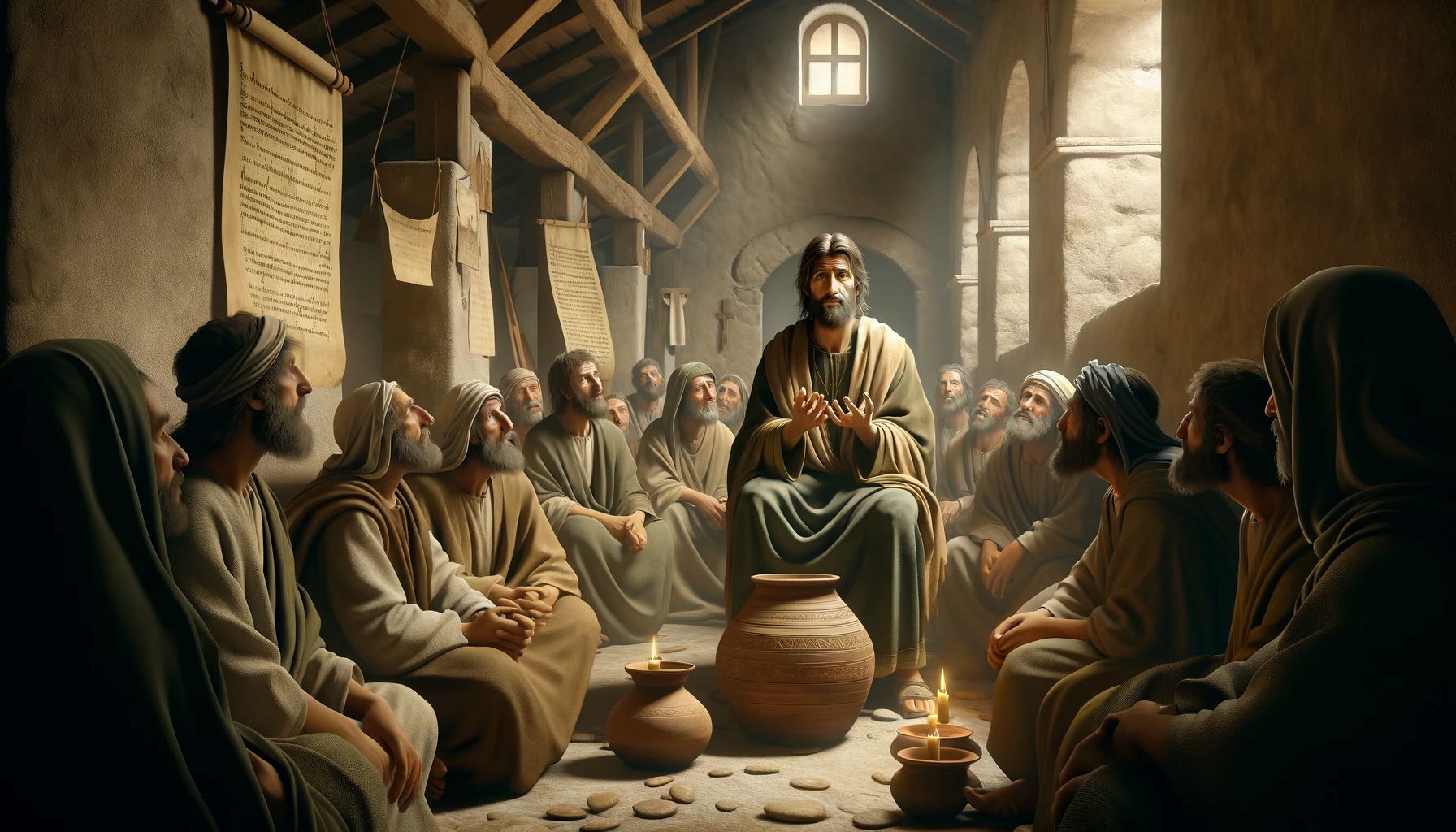Home>Theology and Spirituality>How Many Padrinos In A Baptism


Theology and Spirituality
How Many Padrinos In A Baptism
Published: March 2, 2024
Peter Smith, Editorial Director at Christian.net, combines deep insights into faith, politics, and culture to lead content creation that resonates widely. Awarded for his contributions to religious discourse, he previously headed a major organization for religious communicators, enhancing dialogue on faith's societal impacts.
Learn about the significance of padrinos in a baptism and their role in theology and spirituality. Understand the cultural and religious aspects of this important tradition.
(Many of the links in this article redirect to a specific reviewed product. Your purchase of these products through affiliate links helps to generate commission for Christian.net, at no extra cost. Learn more)
Table of Contents
The Role of Padrinos in a Baptism
In the Catholic faith, the role of padrinos in a baptism is significant. Padrinos, also known as godparents, play a crucial role in the spiritual upbringing of the child being baptized. They are chosen to guide and support the child in their faith journey, providing mentorship and serving as role models. The selection of padrinos is a thoughtful process, as they are entrusted with the responsibility of nurturing the child's spiritual growth.
-
Spiritual Guidance: Padrinos are expected to provide spiritual guidance to the child, offering support and encouragement as they navigate their faith. They are tasked with setting an example of living a virtuous and faithful life, imparting religious teachings, and fostering a strong connection to the church.
-
Support and Mentorship: Padrinos are not only responsible for the child's spiritual well-being but also serve as mentors and sources of support. They are there to offer advice, lend a listening ear, and provide guidance as the child grows in their faith.
-
Role Models: As padrinos, individuals are chosen for their strong faith and moral character. They are expected to exemplify the values and principles of the Catholic faith, serving as role models for the child to emulate.
-
Prayer and Blessings: Padrinos are encouraged to pray for the child and offer blessings, seeking divine guidance and protection for their godchild. Their prayers are believed to have a profound impact on the spiritual journey of the child.
-
Commitment to the Child's Faith: By accepting the role of padrinos, individuals make a commitment to actively participate in the child's religious upbringing. They are present not only on the day of the baptism but throughout the child's life, offering unwavering support and guidance in matters of faith.
The role of padrinos in a baptism extends beyond the ceremonial aspects, emphasizing the importance of their ongoing involvement in the child's spiritual development. Their influence and guidance can have a lasting impact on the child's relationship with the Catholic faith.
Read more: How Many Times Is Baptism Mentioned In Acts
Choosing Padrinos for a Baptism
When it comes to choosing padrinos for a baptism, careful consideration is given to individuals who embody the values and principles of the Catholic faith. The selection process is not taken lightly, as padrinos are entrusted with the spiritual guidance and mentorship of the child. Here are some key factors to consider when choosing padrinos for a baptism:
-
Faith and Commitment: Padrinos should be individuals who demonstrate a strong commitment to their faith. They should be devout Catholics who actively participate in the church community and uphold the teachings of the faith.
-
Moral Character: It is essential to choose padrinos who exhibit moral integrity and virtuous behavior. They should serve as positive role models for the child, embodying the values of compassion, kindness, and honesty.
-
Supportive and Encouraging: Padrinos should be individuals who are supportive and encouraging, willing to provide guidance and mentorship to the child as they grow in their faith. They should be approachable and nurturing, fostering a positive and nurturing environment for the child's spiritual development.
-
Active Participation: When selecting padrinos, it is important to choose individuals who are willing to actively participate in the child's religious upbringing. They should be committed to attending church events, religious ceremonies, and providing ongoing support to the child in matters of faith.
-
Relationship with the Parents: Consideration should be given to the relationship between the potential padrinos and the child's parents. Padrinos should have a close and trusting relationship with the parents, as they will work together to ensure the child's spiritual well-being.
-
Willingness to Serve: Padrinos should willingly accept the responsibilities associated with the role, understanding the significance of their commitment to the child's faith journey. Their willingness to serve as mentors and guides is crucial in the selection process.
-
Spiritual Connection: It is important to choose padrinos with whom the child and the parents share a spiritual connection. Padrinos should be individuals who can foster a meaningful and supportive relationship with the child, nurturing their spiritual growth.
The process of choosing padrinos for a baptism involves thoughtful consideration and discernment. By selecting individuals who embody the core values of the Catholic faith and demonstrate a genuine commitment to the child's spiritual well-being, the role of padrinos becomes a meaningful and impactful aspect of the baptism ceremony.
Responsibilities of Padrinos in a Baptism
The responsibilities of padrinos in a baptism extend beyond the ceremonial aspects, encompassing a profound commitment to the spiritual well-being and growth of the child. As godparents, padrinos undertake significant responsibilities that shape the child's religious upbringing and connection to the Catholic faith. Here are the key responsibilities of padrinos in a baptism:
-
Spiritual Guidance: Padrinos are entrusted with the responsibility of providing spiritual guidance to the child. This involves nurturing the child's faith, imparting religious teachings, and fostering a deep connection to the Catholic Church. Padrinos serve as mentors, offering support and encouragement as the child embarks on their spiritual journey.
-
Support and Mentorship: Padrinos are expected to serve as sources of support and mentorship for the child. They play a vital role in offering guidance, advice, and a listening ear as the child navigates their faith. Padrinos are there to provide reassurance and wisdom, helping the child develop a strong foundation in their religious beliefs.
-
Role Models: As padrinos, individuals are called to exemplify the values and principles of the Catholic faith. They serve as role models for the child, demonstrating virtuous behavior, compassion, and dedication to their faith. By embodying these qualities, padrinos inspire the child to follow a similar path of spiritual growth.
-
Active Participation: Padrinos are expected to actively participate in the child's religious upbringing. This includes attending church events, religious ceremonies, and actively engaging in the child's spiritual education. By being present and involved, padrinos demonstrate their commitment to nurturing the child's faith.
-
Prayer and Blessings: Padrinos are encouraged to pray for the child and offer blessings, seeking divine guidance and protection for their godchild. Their prayers are believed to have a profound impact on the child's spiritual journey, fostering a sense of divine connection and support.
-
Lifelong Commitment: The role of padrinos extends beyond the baptism ceremony. Padrinos make a lifelong commitment to the child's spiritual well-being, offering unwavering support and guidance as the child grows in their faith. This enduring commitment underscores the significance of the role of padrinos in the child's life.
The responsibilities of padrinos in a baptism are deeply rooted in their commitment to nurturing the child's faith and spiritual development. By embracing these responsibilities with dedication and love, padrinos play a pivotal role in shaping the child's relationship with the Catholic faith.
Padrinos Etiquette in a Baptism
When fulfilling the role of padrinos in a baptism, it is essential to observe proper etiquette that reflects the significance of the occasion and the responsibilities associated with the role. Padrinos are expected to conduct themselves with reverence, respect, and a deep sense of commitment to the spiritual well-being of the child. Here are the key etiquettes that padrinos should uphold during a baptism:
-
Preparation and Punctuality: Padrinos should make every effort to prepare for the baptism ceremony and arrive punctually. This demonstrates their respect for the sacred nature of the event and their commitment to actively participating in the child's spiritual journey.
-
Attire: Padrinos should dress modestly and appropriately for the baptism, reflecting the solemnity of the occasion. Their attire should align with the reverence of the sacrament and serve as a symbol of their dedication to the child's spiritual upbringing.
-
Active Participation: Padrinos are expected to actively participate in the baptism ceremony, whether it involves reciting prayers, making symbolic gestures, or standing as witnesses to the child's initiation into the Catholic faith. Their engagement underscores their role as spiritual guides and mentors.
-
Support for the Parents: Padrinos should offer support and reassurance to the child's parents, acknowledging the significance of their role in the baptism. They should work collaboratively with the parents to ensure the child's spiritual growth and well-being.
-
Respect for Tradition: Padrinos should honor and respect the traditions and rituals associated with the baptism ceremony. This includes following the guidance of the officiating clergy, participating in the sacramental rites, and upholding the sacred customs of the Catholic faith.
-
Commitment to the Child's Faith: Padrinos should reaffirm their commitment to the child's faith by actively engaging in their spiritual upbringing beyond the baptism. This involves maintaining a consistent presence in the child's religious education, attending church events, and providing ongoing support and guidance.
-
Exemplifying Virtuous Behavior: Padrinos should exemplify virtuous behavior and moral integrity, serving as role models for the child. Their conduct should reflect the values of compassion, kindness, and devotion to the Catholic faith, inspiring the child to embrace these virtues.
-
Prayer and Blessings: Padrinos should offer prayers and blessings for the child, seeking divine guidance and protection. Their spiritual support through prayer is a fundamental aspect of their role in nurturing the child's faith.
By adhering to these etiquettes, padrinos demonstrate their reverence for the sacrament of baptism and their unwavering commitment to the child's spiritual journey. Their conduct serves as a testament to the profound significance of their role as godparents in the Catholic faith.
The Significance of Padrinos in a Baptism
The significance of padrinos in a baptism is deeply rooted in the spiritual and communal aspects of the Catholic faith. Padrinos play a pivotal role in the initiation of the child into the faith community, symbolizing a commitment to the child's spiritual well-being and growth. Their presence and involvement in the baptism ceremony hold profound significance, shaping the child's connection to the Catholic Church and fostering a sense of belonging within the faith community. Padrinos serve as guardians of the child's faith, offering guidance, support, and mentorship as the child embarks on their journey of religious discovery and devotion.
The role of padrinos in a baptism extends beyond the ceremonial aspects, emphasizing their enduring commitment to the child's spiritual development. As godparents, padrinos are entrusted with the responsibility of nurturing the child's faith, imparting religious teachings, and serving as role models of virtuous behavior. Their influence on the child's spiritual upbringing is profound, as they provide a source of guidance and support in matters of faith. Padrinos offer prayers and blessings for the child, seeking divine guidance and protection, thereby reinforcing the child's connection to the divine and the spiritual community.
Furthermore, padrinos serve as a bridge between the child and the broader Catholic community, fostering a sense of communal support and belonging. Their involvement in the baptism ceremony signifies the collective responsibility of the faith community in nurturing the next generation of believers. Padrinos represent a network of support and guidance for the child, ensuring that they are embraced by the loving embrace of the Catholic Church and its members. Through their role as padrinos, individuals affirm their commitment to upholding the traditions and values of the Catholic faith, passing on the legacy of spiritual devotion and community to the next generation.
In essence, the significance of padrinos in a baptism lies in their role as spiritual guides, mentors, and guardians of the child's faith. Their presence and commitment symbolize the interconnectedness of the Catholic community and the shared responsibility of nurturing and sustaining the faith across generations. Padrinos embody the values of love, compassion, and devotion, serving as beacons of faith for the child and exemplifying the enduring strength of the Catholic community.















